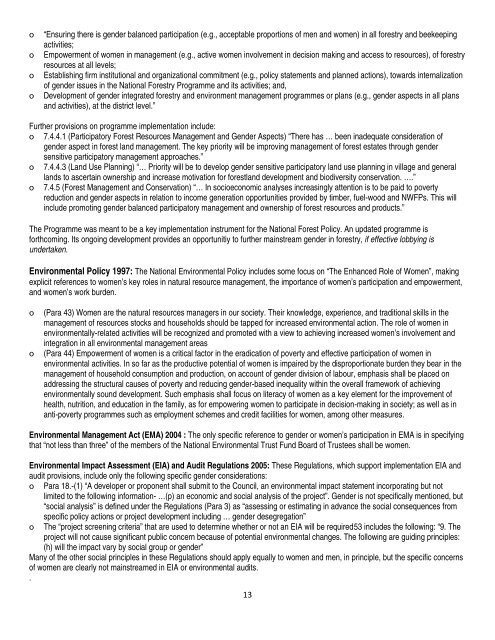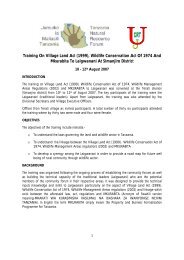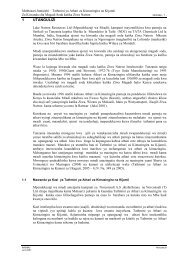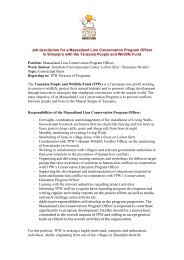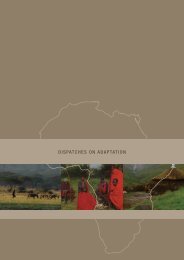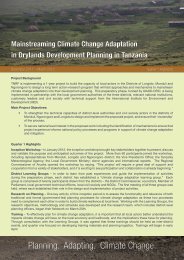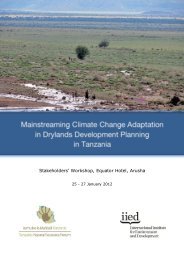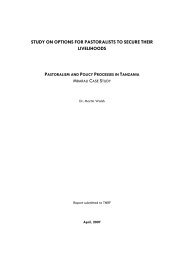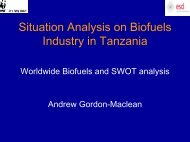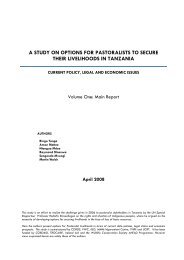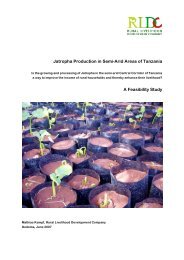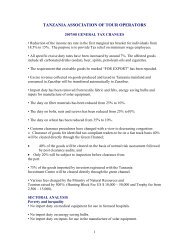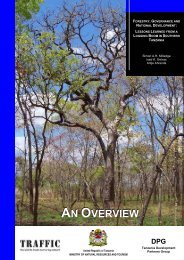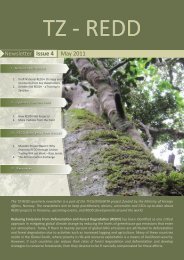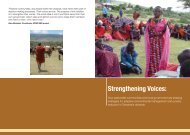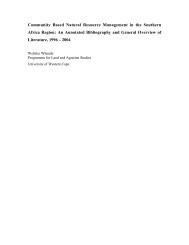Gender and REDD+ in Tanzania An overview of key issues
Gender and REDD+ in Tanzania: An overview of key issues
Gender and REDD+ in Tanzania: An overview of key issues
- No tags were found...
Create successful ePaper yourself
Turn your PDF publications into a flip-book with our unique Google optimized e-Paper software.
o<br />
o<br />
o<br />
o<br />
“Ensur<strong>in</strong>g there is gender balanced participation (e.g., acceptable proportions <strong>of</strong> men <strong>and</strong> women) <strong>in</strong> all forestry <strong>and</strong> beekeep<strong>in</strong>g<br />
activities;<br />
Empowerment <strong>of</strong> women <strong>in</strong> management (e.g., active women <strong>in</strong>volvement <strong>in</strong> decision mak<strong>in</strong>g <strong>and</strong> access to resources), <strong>of</strong> forestry<br />
resources at all levels;<br />
Establish<strong>in</strong>g firm <strong>in</strong>stitutional <strong>and</strong> organizational commitment (e.g., policy statements <strong>and</strong> planned actions), towards <strong>in</strong>ternalization<br />
<strong>of</strong> gender <strong>issues</strong> <strong>in</strong> the National Forestry Programme <strong>and</strong> its activities; <strong>and</strong>,<br />
Development <strong>of</strong> gender <strong>in</strong>tegrated forestry <strong>and</strong> environment management programmes or plans (e.g., gender aspects <strong>in</strong> all plans<br />
<strong>and</strong> activities), at the district level.”<br />
Further provisions on programme implementation <strong>in</strong>clude:<br />
o 7.4.4.1 (Participatory Forest Resources Management <strong>and</strong> <strong>Gender</strong> Aspects) “There has … been <strong>in</strong>adequate consideration <strong>of</strong><br />
gender aspect <strong>in</strong> forest l<strong>and</strong> management. The <strong>key</strong> priority will be improv<strong>in</strong>g management <strong>of</strong> forest estates through gender<br />
sensitive participatory management approaches.”<br />
o 7.4.4.3 (L<strong>and</strong> Use Plann<strong>in</strong>g) “… Priority will be to develop gender sensitive participatory l<strong>and</strong> use plann<strong>in</strong>g <strong>in</strong> village <strong>and</strong> general<br />
l<strong>and</strong>s to ascerta<strong>in</strong> ownership <strong>and</strong> <strong>in</strong>crease motivation for forestl<strong>and</strong> development <strong>and</strong> biodiversity conservation. ….”<br />
o 7.4.5 (Forest Management <strong>and</strong> Conservation) “… In socioeconomic analyses <strong>in</strong>creas<strong>in</strong>gly attention is to be paid to poverty<br />
reduction <strong>and</strong> gender aspects <strong>in</strong> relation to <strong>in</strong>come generation opportunities provided by timber, fuel-wood <strong>and</strong> NWFPs. This will<br />
<strong>in</strong>clude promot<strong>in</strong>g gender balanced participatory management <strong>and</strong> ownership <strong>of</strong> forest resources <strong>and</strong> products.”<br />
The Programme was meant to be a <strong>key</strong> implementation <strong>in</strong>strument for the National Forest Policy. <strong>An</strong> updated programme is<br />
forthcom<strong>in</strong>g. Its ongo<strong>in</strong>g development provides an opportunitiy to further ma<strong>in</strong>stream gender <strong>in</strong> forestry, if effective lobby<strong>in</strong>g is<br />
undertaken.<br />
Environmental Policy 1997: The National Environmental Policy <strong>in</strong>cludes some focus on “The Enhanced Role <strong>of</strong> Women”, mak<strong>in</strong>g<br />
explicit references to women’s <strong>key</strong> roles <strong>in</strong> natural resource management, the importance <strong>of</strong> women’s participation <strong>and</strong> empowerment,<br />
<strong>and</strong> women’s work burden.<br />
o<br />
o<br />
(Para 43) Women are the natural resources managers <strong>in</strong> our society. Their knowledge, experience, <strong>and</strong> traditional skills <strong>in</strong> the<br />
management <strong>of</strong> resources stocks <strong>and</strong> households should be tapped for <strong>in</strong>creased environmental action. The role <strong>of</strong> women <strong>in</strong><br />
environmentally-related activities will be recognized <strong>and</strong> promoted with a view to achiev<strong>in</strong>g <strong>in</strong>creased women’s <strong>in</strong>volvement <strong>and</strong><br />
<strong>in</strong>tegration <strong>in</strong> all environmental management areas<br />
(Para 44) Empowerment <strong>of</strong> women is a critical factor <strong>in</strong> the eradication <strong>of</strong> poverty <strong>and</strong> effective participation <strong>of</strong> women <strong>in</strong><br />
environmental activities. In so far as the productive potential <strong>of</strong> women is impaired by the disproportionate burden they bear <strong>in</strong> the<br />
management <strong>of</strong> household consumption <strong>and</strong> production, on account <strong>of</strong> gender division <strong>of</strong> labour, emphasis shall be placed on<br />
address<strong>in</strong>g the structural causes <strong>of</strong> poverty <strong>and</strong> reduc<strong>in</strong>g gender-based <strong>in</strong>equality with<strong>in</strong> the overall framework <strong>of</strong> achiev<strong>in</strong>g<br />
environmentally sound development. Such emphasis shall focus on literacy <strong>of</strong> women as a <strong>key</strong> element for the improvement <strong>of</strong><br />
health, nutrition, <strong>and</strong> education <strong>in</strong> the family, as for empower<strong>in</strong>g women to participate <strong>in</strong> decision-mak<strong>in</strong>g <strong>in</strong> society; as well as <strong>in</strong><br />
anti-poverty programmes such as employment schemes <strong>and</strong> credit facilities for women, among other measures.<br />
Environmental Management Act (EMA) 2004 : The only specific reference to gender or women’s participation <strong>in</strong> EMA is <strong>in</strong> specify<strong>in</strong>g<br />
that “not less than three” <strong>of</strong> the members <strong>of</strong> the National Environmental Trust Fund Board <strong>of</strong> Trustees shall be women.<br />
Environmental Impact Assessment (EIA) <strong>and</strong> Audit Regulations 2005: These Regulations, which support implementation EIA <strong>and</strong><br />
audit provisions, <strong>in</strong>clude only the follow<strong>in</strong>g specific gender considerations:<br />
o Para 18.-(1) “A developer or proponent shall submit to the Council, an environmental impact statement <strong>in</strong>corporat<strong>in</strong>g but not<br />
limited to the follow<strong>in</strong>g <strong>in</strong>formation- …(p) an economic <strong>and</strong> social analysis <strong>of</strong> the project”. <strong>Gender</strong> is not specifically mentioned, but<br />
“social analysis” is def<strong>in</strong>ed under the Regulations (Para 3) as “assess<strong>in</strong>g or estimat<strong>in</strong>g <strong>in</strong> advance the social consequences from<br />
specific policy actions or project development <strong>in</strong>clud<strong>in</strong>g … gender desegregation”<br />
o The “project screen<strong>in</strong>g criteria” that are used to determ<strong>in</strong>e whether or not an EIA will be required53 <strong>in</strong>cludes the follow<strong>in</strong>g: “9. The<br />
project will not cause significant public concern because <strong>of</strong> potential environmental changes. The follow<strong>in</strong>g are guid<strong>in</strong>g pr<strong>in</strong>ciples:<br />
(h) will the impact vary by social group or gender”<br />
Many <strong>of</strong> the other social pr<strong>in</strong>ciples <strong>in</strong> these Regulations should apply equally to women <strong>and</strong> men, <strong>in</strong> pr<strong>in</strong>ciple, but the specific concerns<br />
<strong>of</strong> women are clearly not ma<strong>in</strong>streamed <strong>in</strong> EIA or environmental audits.<br />
.<br />
13


